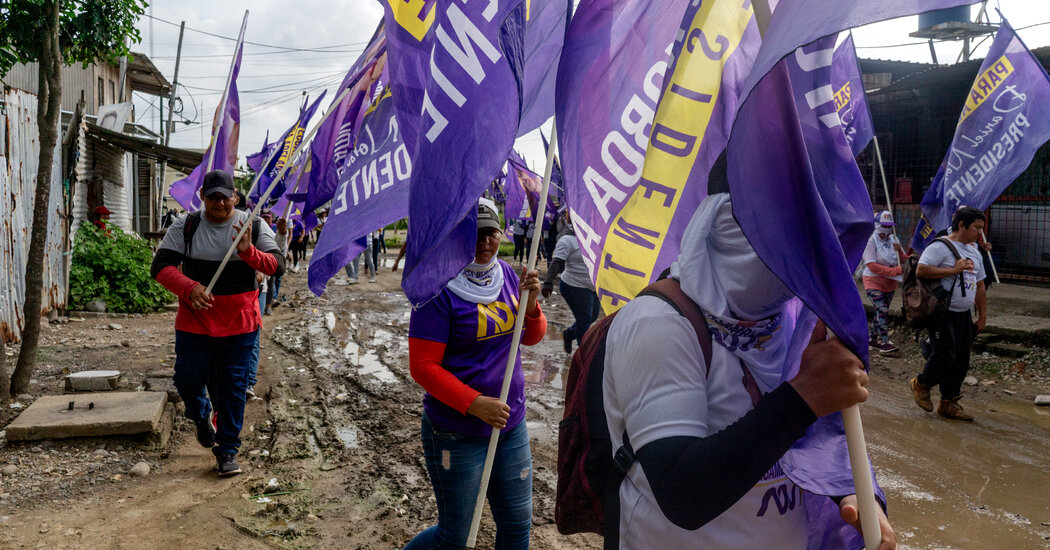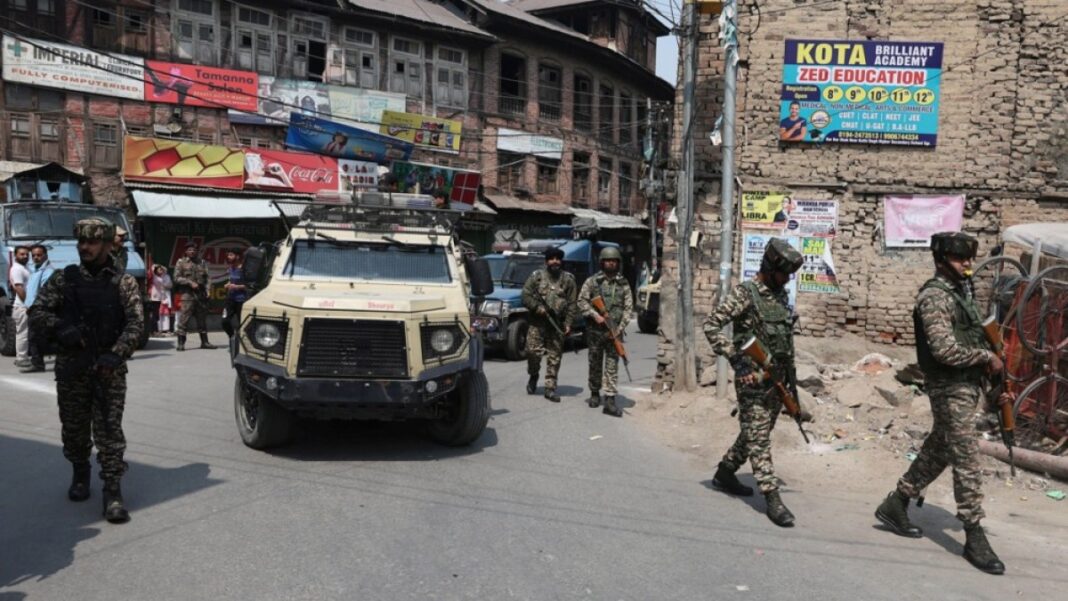The city of Machala is dotted with posters of Ecuador’s two presidential candidates, their smiling faces looking out over shuttered businesses and streets that empty out after 6 p.m. because of rival gangs that torment the city.
Machala, a port city south of Guayaquil, is a microcosm of the challenges facing the South American country — including chronic unemployment and a security crisis driven by a surge in drug violence — that many voters say are their biggest concerns ahead of the runoff election on Sunday.
The election pits the incumbent, President Daniel Noboa, the heir to a billionaire banana magnate who rose from political obscurity to win a truncated term after the previous president faced impeachment, against Luisa González, the handpicked successor of a populist titan of Ecuadorean politics.
Mr. Noboa has positioned himself as the tough-on-crime candidate, and as the politician best prepared to lead Ecuador on the global stage and negotiate with world leaders like President Trump.
Ms. González has been defined by her association with a former Ecuadorean president, Rafael Correa, who remains revered by many in the country eight years after he left office despite scandals and controversy.
His presidency saw a booming economy, low crime rates and investment in health and education. But he was also convicted on corruption charges and accused of having authoritarian tendencies.
Mr. Noboa narrowly edged out Ms. González in the first round, in February, but did not surpass 50 percent of the vote to avoid a second round. Polls show Sunday’s election as a dead heat.
And nowhere is that split more evident than in Machala, the capital of El Oro, one of Ecuador’s most dangerous states. The port city of roughly 288,000 is one of the world’s largest shipment points for bananas — it is sometimes called “the banana capital of the world.”
But what was once also a bustling tourist destination and gastronomic hub has become largely a ghost town.
Two rival gangs, Los Choneros and Los Lobos, are fighting for control of the local drug trade, killing residents in broad daylight, setting off bombs in the streets and extorting shopkeepers and politicians.
Mr. Noboa has been criticized for his hard-line stance on the country’s gang violence, which some civil rights groups say is an overreach of presidential authority and an infringement on human rights.
But in Machala, both supporters and opponents of the president say they would like to see more action from law enforcement, not less. Across the city, days before an election in a country where a presidential candidate was assassinated two years ago, not a single police officer or soldier was seen patrolling the streets.
Erika González, 36, was standing in her front door when a parade organized by supporters of Luisa González marched down the street. A volunteer handed her a calendar with the candidate’s face on it. She took it out of politeness, she said, but planned to vote for Mr. Noboa.
Her 17-year-old nephew, Carlos Choez, was shot and killed last year, she said, as he was leaving school because he had resisted recruitment by a criminal gang.
She said she believed Mr. Noboa could stem the violence. “I have faith that if we give him the time he needs, he will be able to control that,” she said.
She also thinks Ecuador needs help from the United States to take on drug gangs, something that is more likely to happen under Mr. Noboa, she said.
During Mr. Correa’s tenure, Ecuador had an antagonistic relationship with the United States, and experts say his expulsion of American forces from the country hampered Ecuador’s ability to control its borders and eased the way for transnational criminal groups move drugs through and out of the country.
But Ecuador’s homicide rate actually dropped under his government because of increased policing and a commodities boom that yielded more money for law enforcement. Since Mr. Noboa took office in November 2023, the homicide rate dropped early in his tenure, but then started rising.
At Ms. González’s campaign headquarters in Machala, a poster depicts her face next to Mr. Correa’s with the slogan, “The resurgence of the homeland.”
“Correismo” runs deep in Machala, and for many, it is deeply personal.
Many remember the Correa administration’s investment in health infrastructure, and say the upgrades to one of the city’s main hospitals were life changing.
Silvia Endara, 42, said she went to the hospital in 2012 to have a brain cyst that was causing seizures removed, and doctors told her she was five weeks pregnant. Renovations meant the hospital was not yet permitted to perform surgeries, but she said doctors got permission from the Correa government to proceed with the operation anyway.
Doctors removed the cyst, but warned that the procedure and its side effects could lead to her baby being born with health problems. But she gave birth to a healthy daughter, Gema, who is now 12.
“I will always give thanks for my life and my daughter’s life to that man, Rafael Correa,” she said.
Even within the banana industry, where the Noboa family made its name, workers are divided over who they support.
Mr. Trump’s universal 10 percent tariffs for many countries are bound to affect Ecuador, which is one of the top banana exporters to the United States.
But Noboa supporters point out that Mr. Noboa has a relatively warm relationship with Mr. Trump that could help the country.
The president was one of the few Latin American leaders invited to Mr. Trump’s inauguration, and the two had a meeting last month at Mar-a-Lago, Mr. Trump’s private club in Palm Beach, Fla.
Mr. Noboa’s re-election could lead to “a more friendly position” between the two countries, said Shirley Morocho, 30, who works in quality control for a private company, visiting banana farms across the region.
While Ms. González has tried to strike a friendlier tone toward the United States during her campaign, many critics are skeptical.
“Luisa is practically Correa’s shadow,” Ms. Morocho said, “so I don’t think they are going to have a very good relationship.”
Jonathan Chacha, 35, a councilman in the nearby town of El Guabo and a supporter of Ms. González, said his district, dominated by the banana industry, will be heavily affected by tariffs. Still, he sees Ms. González as the better choice.
Mr. Noboa and Mr. Trump’s relationship is mostly for show, he said, and has yet to produce any tangible benefits.
Mr. Chacha said Ms. González was better positioned to build on the good relationship that Mr. Correa had with China, which brought significant projects to the country.
“They are the biggest exporters of development in the whole world,” he said.
Days before the election, Carlos Banchón, 56, a boat operator, remained torn. He has been a longtime supporter of Mr. Correa’s party, but was considering switching his allegiance to Mr. Noboa.
He prefers the president’s stance on crime. The violence has scared away visitors to the region, hurting his business ferrying tourists between Puerto Bolívar, a port community outside Machala, and the beachside retreat of Jambeli.
But he feels a commitment to Mr. Correa’s party because of the renovated hospital, where he said his wife received lifesaving care after she fell and went into early labor.
“I can’t choose one or the other,” he said. “It’s very complicated.”


